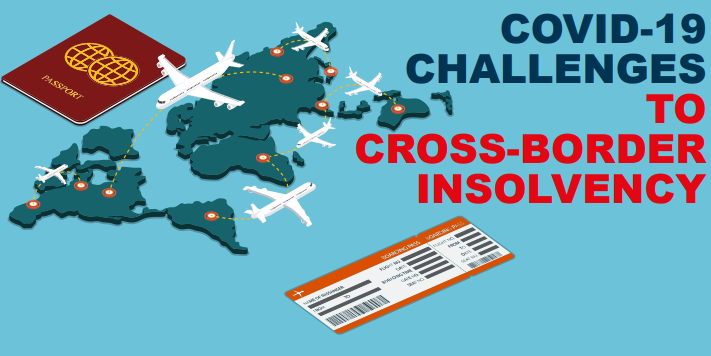Knowledge Hub
Join the Conversation!
Impartial and independent, ThoughtLeaders4 FIRE Knowledge Hub hosts cutting edge industry content and insight.
Email maddi@thoughtleaders4.com to submit content.
COVID-19 Challenges to Cross-Border Insolvency
Date: 15/07/2020 Type: Articles Topic: FIRE | Insolvency |COVID-19 has had an overwhelming impact on the global economy. Future economic effects of the pandemic will largely depend on the efficiency of government actions. At present, record number of personal, corporate, local, and cross-border bankruptcy filings is being anticipated due to the virus.[1] A vast majority of airlines is likely to collapse without extensive financial support paving the way to a litany of multinational failures.[2]
Cross-border insolvency is a complex process involving opposing interests, contrarian regulations, and multiple jurisdictions. However, coronavirus further exacerbates a myriad of issues that already exist.
- Race of Creditors
In light of the outbreak, countries are implementing individual measures regarding insolvency proceedings and restructurings. Some have provided for a temporary stay on obligation to file for insolvency (Czech Republic, Germany, and Spain), a moratorium on creditors’ initiation of bankruptcy proceedings (Russia), and a “breathing space” period (as proposed in the UK).[3] These steps are intended to alleviate distress caused by the economic impact of the virus.
On the other hand, creditors of such companies are also suffering from the pandemic. Quite possibly, they will not be satisfied with the government response to the crisis, which restrains them from seeking debt recovery. For this reason, they may look for alternative ways of collecting their claims.
In particular, question remains whether such support measures protect those debtors who have vital assets and representative offices in jurisdictions, which do not take equal steps. Will creditors try to get ahead of each other in order to be the first ones to seize assets in such jurisdictions? If so, race of creditors[4] may nullify government attempts to keep businesses afloat.
- Pari Passu
Such actions would also be contrary to the principle of pari passu, a fundamental rule of corporate insolvency law. Pari passu means “proportionally, without preference”[5] and, in general terms, provides that assets of a company in insolvency are equally distributed between creditors.[6]
It is further possible that due to COVID-19 restrictions some foreign creditors are not even going to be able to effectively take part in the distribution of a debtor’s assets. For instance, should the European Union lift internal restrictions on movement but continue to maintain its borders closed to non-EU residents, is that going to mean that creditors outside of the EU have equal representation rights? Would they be able to challenge such distribution? Failing which, value of the insolvency estate and other creditors’ interests may end up being damaged.
- COMI
It is likely that national stimulus measures are going to apply in respect of businesses that have their centre of main interest (“COMI”) in such jurisdictions.[7] In case of European companies, jurisdiction of the registered office shall be presumed to be their COMI.[8] However, this presumption is rebuttable based on factual circumstances and shall not apply if the registered office has been moved to another EU member state within three-month period prior to the request for opening of insolvency proceedings.[9]
In this regard, it will be worth following and analysing how above issues are going to be dealt with in bankruptcy proceedings initiated in jurisdictions, which are not debtor’s COMI (e.g., country of debtor’s registered office) and do not offer protective measures.
- Conflict of Laws
In some jurisdictions, directors can be found personally liable for failure to request opening of insolvency proceedings and for insolvent trading (Australia, Germany, Singapore, the UK). In these uncertain times, such statutory duties may cause directors to cease trading or pre-emptively file for bankruptcy as a way to avoid potential liability.
In response to directors’ anxiety during the pandemic, the above mentioned governments have temporarily waived directors’ obligation to initiate bankruptcy proceedings. Additionally, wrongful trading rules were relaxed.
However, the way these emergency measures are going to be perceived in cross-border insolvency proceedings remains unclear. Will it lead to discrepancies in their interpretation and application? Is there a way of challenging such transactions?
- Court-to-Court Cooperation
The way COVID-19 has impacted global community is unprecedented. The spread of infection has been uneven around the world. As some countries are already relaxing controls, others are yet to reach their peak. Unsurprisingly, whether bankruptcy courts are open or not differs from state to state.
Due to lockdown measures and restrictions to operating hours court-to-court cooperation is going to be hampered. Simultaneously, foreign representatives’ involvement, which often requires physical attendance, runs the risk of failing to meet the “maximum extent possible”[10] standard. As a result, communication of insolvency courts and interested parties is more challenging than ever.
Multiple questions regarding efficiency of international insolvency cases in times of COVID-19 remain unanswered. Will creditors and administrators be able to obtain recognition of bankruptcy proceedings in foreign jurisdictions to gain access to assets? What will be the framework for creditors, debtors, administrators, and courts to handle such situations? In order to find successful resolution, cross-border insolvency cooperation will have to develop accordingly.
Should the virus pandemic be brought under control in the foreseeable future, some of these issues may end up getting resolved on their own. However, in case of prolonged contagion, we are likely to see the number of these challenges continuing to rise.
[1] See, e.g., https://www.bloomberg.com/news/articles/2020-04-10/record-bankruptcies-predicted-in-next-year-as-unemployment-soars
[2] See, e.g., https://www.businessinsider.com/coronavirus-airlines-that-failed-bankrupt-covid19-pandemic-2020-3
[3] See, e.g., INSOL International and the World Bank's Global Guide: an interactive map of measures adopted to support distressed businesses through the COVID-19 crisis at http://insol-techlibrary.s3.amazonaws.com/5685f850-7835-478a-ac58-688cc832e4ba.pdf?AWSAccessKeyId=AKIAJA2C2IGD2CIW7KIA&Expires=1588116491&Signature=4SFnJ24RWpwHPA8q0C5eb%2B81EtI%3D
[4] See, e.g., J.A. Kirshner, International Bankruptcy: The Challenge of Insolvency in a Global Economy (2018), I. Merovach, The Future of Cross-Border Insolvency: Overcoming Biases and Closing Gaps (2018).
[5] R. Mokal, Corporate Insolvency: Theory and Application (2005).
[6] See, e.g., I. Fletcher, The Law of Insolvency (2017), Philip R. Wood, Principles of International Insolvency (2007).
[7] See UNCITRAL Model Law on Cross-Border Insolvency with Guide to Enactment and Interpretation.
[8] Art. 3 of the Regulation (EU) 2015/848 of the European Parliament and of the Council of 20 May 2015 on Insolvency Proceedings (Recast).
[9] Id.
[10] Art. 25 of the UNCITRAL Model Law on Cross-Border Insolvency (1997).
Author
Ays Lidzhanova - Egorov Puginsky Afanasiev & Partners (Russia)
Our FIRE Corporate Partners

































